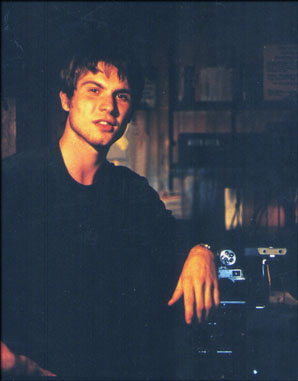
The borders of Europe seem to
move and fade as the centuries pass, but the cultures remain
rich and diverse, steeped in tradition and mystery. The Bezemer
family roots have been firmly planted in the rich history of
Holland since the 16th century, but Hans fell in love with the
city of Berlin on his first visit. So it seems serendipitous
that a young writer adrift in his twenties found his second home
in a city long divided, and Hans returned there year after year
to make sense of a city and young mind in transition through
a rare gift for writing prose. Without intention, his prose evolved
to capture the heart of East-West Berlin, a city he says, is
gone and only lives in memory.
The story of "Night Train to Berlin" could be
situated in the late fifties, early sixties when trains from
West to East were still labeled "Interzone Zug". It
took 5 hours or more to get there from Hannover. Not much changed
until the early nineties when the (West) Germans renovated the
tracks, so trains could do about 80 miles per hour instead of
the usual 40. You can get there now in about 2 hours.
International trains halted
at Friedrichstraße in those days and you were greeted with
"Willkommen in der Hauptstadt der Deutschen Demokratischen
Republik" (Welcome to the capital of the German Democratic
Republic). They could hardly say "Berlin", cause it
was only one half of that city. "East Berlin" was out
of the question too, because that would indicate there was a
West Berlin that they didn't want to recognize. If they referred
to West Berlin, they even wrote "Westberlin", so it
looked like an ordinary cityname, not the name of a divided city.
Yeah, Berlin was a pretty
weird place; I loved it. A great place when you're young and
know the rules. You can't go there anymore.
That city is gone and only lives in memory.

I'm very interested in the
human experience. Its moments of loneliness, even when we share
the room with other people. The incapacity to return to paradise.
We frequently visit it, but we seem unable to stay there. Not
why we are not allowed to, but why we keep leaving it.
Hans
Born in 1960, Hans
Bezemer earned his masters degree in Biology and Geography
in Delft, Holland. A successful software developer, he has published
articles in international computer magazines and written notable
computer programs and manuals. He is interested in theoretical
physics, philosophy, methodology, which is not only helpful in
his current profession as computer management consultant, but
also greatly influences his writing.
Hans published his first book
of fiction entitled A Shadow in the Rain in 1999. It is
printed in German Ein Schatten im Regen and Dutch Een
schaduw in de regen.

Fluent in three languages, Hans
often finds himself in a dilemma of words ....
Translations of prose can
be correct and skillfully executed. Still, reading each version
of the same work, there is a slight difference in atmosphere.
The English is poetic, the Dutch version has a slight matter-of-fact-ness
and the German version is harsher. You have more pity with the
man in the English version than the German version. I see no
way to correct that.
I once read "On the Road"
in Dutch. I hated the book, found it boring. It had completely
lost its poetic qualities. I can no better describe what it is
to be European. On one hand, you have the richness of all these
cultures combined. On the other hand, you're unable as a writer
to translate those feelings and concepts fully into another culture
and you feel lacking. Like brushes and paints that are perfect
in their own right, but cannot be combined, like water colors
with oil paint. You can envision this painting, but only in your
own mind. I know of only one sentence that is truly European:
"Adieu, sweet Bahnhof."
It's perfect.
Hans lives in the Hague, but
regards himself a 'free time' Berliner.


